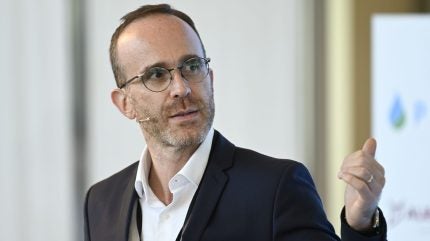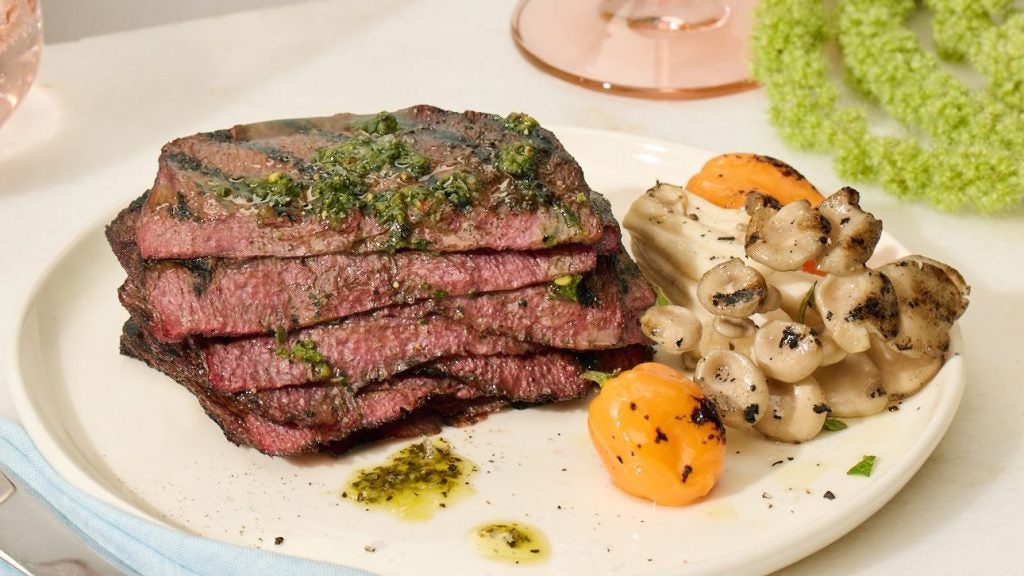
Founded in 2017, cultivated-meat business Aleph Farms is finally on the verge of commercially launching its first product as the company sets a path to reach profitability by the end of 2028.
A pilot manufacturing facility is already in place in its home market of Israel where Aleph Farms gained regulatory approval around two years ago for its Petit Steak meat cuts. Other countries, however, such as target destinations in the UK, Switzerland and the US, are still weighing up applications.

Discover B2B Marketing That Performs
Combine business intelligence and editorial excellence to reach engaged professionals across 36 leading media platforms.
Nevertheless, Aleph Farms has just signed an agreement with The Cultured Hub, a joint venture with financial backer Migros Industrie, Givaudan, and Bühler Group, to set up its first European production base in Kemptthal, Zurich.
Co-founder and CEO Didier Toubia discusses Aleph Farms’ plans and aspirations with Just Food’s Simon Harvey.
Simon Harvey (SH): What are the wider manufacturing plans?
Didier Toubia (DT): We’re developing a strategy to set up the Swiss operations as a hub for Europe and then expanding to the UK and potentially Germany and Austria.
We have a filed our regulatory applications in Switzerland and the UK. We are also working on approvals in Asia – Singapore and Thailand – another geography where we intend to develop in the next couple of years.

US Tariffs are shifting - will you react or anticipate?
Don’t let policy changes catch you off guard. Stay proactive with real-time data and expert analysis.
By GlobalDataSH: What’s the status with the first product launch?
DT: We’re currently completing the transfer of an optimised production platform into the pilot facility in Israel – the same technology platform we intend to implement in Switzerland and Europe.
We are on track to scale up production and to probably launch in the next six months.
We changed the business plans at the beginning of 2023. We raised a lot of money in 2021 when the goal was to expand and scale up quickly, with a focus on the US.
We started working on a large-scale facility in Pennsylvania but we saw the macroeconomic environment changing during the second half of 2022. We made a decision at the beginning of ‘23 to instead of investing massively in capex, in equipment and setting up production facilities in the US, to spend more time optimising our production process, reducing our costs, and improving the scalability of the production platform, which is what we’ve done.
We decided to focus first on Israel and Singapore, and then we started the plan for Switzerland and the UK. We expect by the end of ‘28 to reach EBITDA profitability.
SH: You’re talking about profitability but how is Aleph Farms making money when the first product hasn’t been rolled out?
DT: We just got a full economic analysis from an independent party in Switzerland that the current technology we have, without any further breakthroughs or technological risks, can lead to positive EBITDA and to profitability at the intermediate production scale. And then to larger margins and higher profitability at larger scale.
SH: Is the company making any money?
DT: We’re not selling yet and we’re not yet making money. We have spent the last two to three years on cost reduction and on scalability improvements.
SH: How much money has Aleph Farms raised so far and will you need more ahead of commercialisation?
DT: We raised a bit more than $140m. We’re currently in the process of finalising a round we started at the end of last year. We already raised part of the money and we’re currently working on finalising the full investment. We’re raising $20-$25m and we already closed $7.5m.
SH: Has the money all been used on R&D and getting the technology set up?
DT: Yes, and on transferring this technology to a commercial production facility and setting up the operations ahead of launching the product. It is the facility in Israel and the facility in Switzerland.
SH: Who’s going to finance the construction of the plant in Kemptthal?
DT: It’s an existing plant and the money has been invested by the owners of The Cultured Hub. We just completed the first training phase for them to start implementing our production process and we should complete the tech transfer and the set-up of this commercial facility during 2026.
Aleph Farms has an asset-light strategy, cultivating ourselves through third-party collaborations and leveraging existing facilities of third parties and not directly owning our plants.
SH: When are you hoping to start production in Switzerland?
DT: Production should start around the end of 2026. It will probably take one year to complete the tech transfer, the initial scale up and to get the approval for the facility, the commissioning, and get it ready for commercial production.

SH: The Switzerland facility will produce the Petit Steaks?
DT: Our Petit Steak is our first product, which are slices of cultivated beef cuts, a hybrid product that incorporates animal cells into a plant-based matrix. Soy is the plant-based component.
The purpose of Petit Steak is to target the mega trends for proteins and for healthy indulgence within the flexitarian segment. The goal is not to replace meat but to diversify choices and provide a unique value proposition to a very well-defined segment of the market.
SH: When production starts in Switzerland, is that intended to supply other markets in Europe?
DT: We do intend to expand from Switzerland into additional markets. This plant does not have huge capacity, so we intend to further expand our production capacity beyond this initial plant, together with The Cultured Hub.
We are looking at options to set up some production capacity in the UK as well, and potentially in other European countries.
SH: You have also applied for regulatory approval in the UK, Switzerland and Singapore. What is the status?
DT: We are working on it. It’s difficult to give timelines because it’s never taking the time we expect. I hope we can get this clearance very soon.
SH: What sales channels is Aleph Farms targeting given restaurants have tended to be the main testing grounds for cultivated meat products?
DT: We intend to launch first in restaurants and foodservice outlets.
SH: Retail is going to come much later then?
DT: Yes, I believe so.
SH: In the past, you said Aleph Farms had entered a production partnership with BBGI and Fermbox Bio in Thailand. Is that still in existence?
DT: We’re currently developing our plan in two different geographies. One is Europe, where we intend to have a wider global base, and with the first focus on Switzerland and the UK, potentially Germany.
The other direction we are taking is South East Asia, starting with Singapore, where we expect to get clearance soon, and from Singapore expanding into Thailand. Those plans remain valid.
SH: BBGI and Fermbox Bio are on standby then? You formed a production agreement which will kick in when you get approval?
DT: That’s correct. We’re looking for the approval in Singapore before we invest more resources in that area. We might have a small-scale pilot line in Singapore but we intend to proce at larger scale in Thailand.
SH: Aleph Farms also entered partnerships with BRF in Brazil, Thai Union and Mitsubishi in Japan. Are they all similar manufacturing partnerships?
DT: We’re building a consortium in South East Asia with different types of partners which are complementary to each other, so we can build stronger traction in the region.
Mitsubishi is actively working with us. We’ve done some market research together and some testing. The current focus on Japan is the regulation and we haven’t yet filed in Japan because the regulatory body is still in the process of finalising the guidance for companies.
We are considering manufacturing in Japan in the mid-term. As far as Asia is concerned, we will start with South East Asia and then in the mid- to long-term expand into Japan, may be South Korea. To have one hub in South East Asia and another in eastern Asia. Brazil is longer term, the same as Japan.
SH: What are the main challenges for the cultivated-meat industry – convincing regulators, governments or consumers, for instance?
DT: In Europe, there’s a wide group of countries which are investing in the space and investing in research and infrastructure, funding grants for companies as well, same as in the US, same as in many Asian countries and Middle Eastern countries. In Asia – Singapore, Thailand, Malaysia, Australia, Japan, Hong Kong and China – they are all investing and developing programmes for implementing cultivated meat. Overall, there’s strong governmental support.
The regulation takes time just because it’s a new topic. Each company is using slightly different technologies, raising different types of questions. Regulation is a limiter even though it’s moving in the right direction.
The other limiter for the industry is capital. There had been a lot of money invested in the space between 2020 and 2022, then in 2023 and 2024 it was almost impossible to raise money. That is now coming back a little bit.
Aleph Farms has spent time and quite a lot of resources decreasing the costs, improving the scalability of the production process, improving the products, refining the positioning and the market fit. That has built a much more robust foundation for sustainable and profitable growth.
SH: Aside from cultivated meat, plant-based meat has had a bit of a hard time in the past couple of years. Does that have any implications in terms of perceptions?
DT: The fact the plant-based category hasn’t delivered on its promise is raising questions about the overall approach for complementary proteins. I think the plant-based category has oversold its potential.
The advantage of cultivated meat is we can provide a higher quality product in terms of taste, flavour, cooking properties and nutritional benefits because we incorporate real animal cells into the product.
We have five or six ingredients in our first product with a focus on natural ingredients. We have nothing like methylcellulose or those types of chemical additives, no masking agents, no artificial flavouring. Our product has a much lower level of processing and fewer ingredients, while being higher in quality.
I believe that cultivated meat and the use of cells will probably take the whole complementary protein approach to the next level.
SH: Do you think consumers are still going to need some convincing because it’s a new technology?
DT: It’s not a matter of technology. It’s more a matter of developing the right product and selling it at the right price to the right customer. Petit Steak is not intended to replace existing cuts but rather to build a different category to focus on health and nutrition.
We’re targeting the younger segment of the population, millennials and below, who are looking to increase protein intake while minimising calories and fat intake.
We are leveraging a mega trend in the market, which has been accelerated in the US by GLP-1 drugs.
We’re really trying to develop a unique value proposition in the market to make the product attractive for specific segments. We’re not trying to replace meat and we don’t intend to launch a product that everyone will buy.
We see it more as a new choice, a new category, which is expanding the options for the average consumer.
We might sell at a slightly higher price when we launch because we’ll have small quantities. But the idea would be to very quickly reach price parity and to make sure we can drive a profitable and a sustainable business without any premium pricing.





